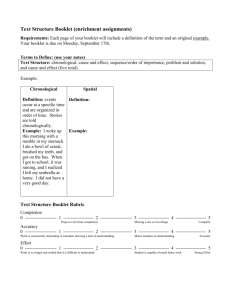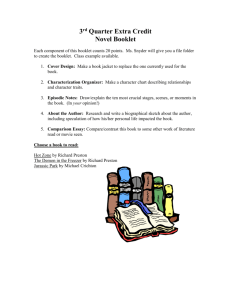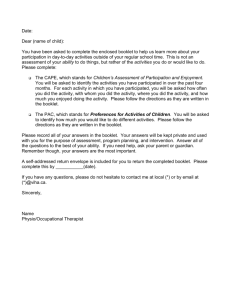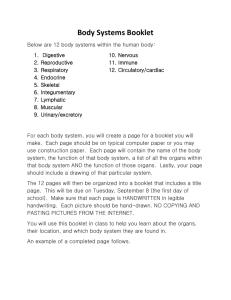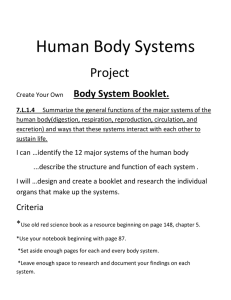File
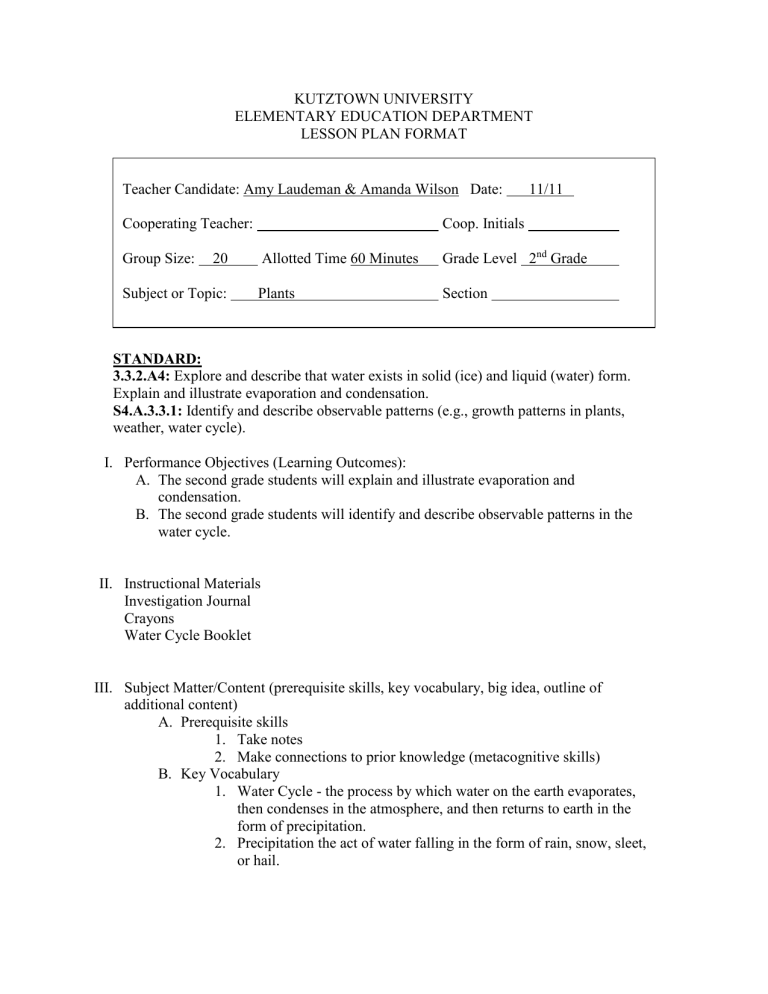
KUTZTOWN UNIVERSITY
ELEMENTARY EDUCATION DEPARTMENT
LESSON PLAN FORMAT
Teacher Candidate: Amy Laudeman & Amanda Wilson Date: 11/11
Cooperating Teacher: Coop. Initials
Group Size: 20 Allotted Time 60 Minutes Grade Level 2 nd Grade
Subject or Topic: Plants Section
STANDARD:
3.3.2.A4: Explore and describe that water exists in solid (ice) and liquid (water) form.
Explain and illustrate evaporation and condensation.
S4.A.3.3.1: Identify and describe observable patterns (e.g., growth patterns in plants, weather, water cycle).
I.
Performance Objectives (Learning Outcomes):
A.
The second grade students will explain and illustrate evaporation and condensation.
B.
The second grade students will identify and describe observable patterns in the water cycle.
II.
Instructional Materials
Investigation Journal
Crayons
Water Cycle Booklet
III.
Subject Matter/Content (prerequisite skills, key vocabulary, big idea, outline of additional content)
A.
Prerequisite skills
1.
Take notes
2.
Make connections to prior knowledge (metacognitive skills)
B.
Key Vocabulary
1.
Water Cycle - the process by which water on the earth evaporates, then condenses in the atmosphere, and then returns to earth in the form of precipitation.
2.
Precipitation the act of water falling in the form of rain, snow, sleet, or hail.
not absorbed by the earth.
6.
Photosynthesis - the process by which a green plant uses sunlight to change water and carbon dioxide into food for itself.
C.
Big Idea
1.
The needs of a plant
D.
Additional content
IV.
Implementation
A.
Introduction
1.
To begin class, the teacher will instruct student to turn to the hand sanitizer worksheet. (see attached)
2.
Teacher will give instructions to students.
3.
One-by-one students will take a small drop of hand sanitizer on their hands and rub them together.
4.
Each student will then draw on their worksheets their observations.
5.
After a few minutes, they will again draw on their worksheets what they see.
6.
Teacher will say, “Why do you think the hand sanitizer went away?”
7.
Teacher will lead/ prompt discussion towards the hand sanitizer evaporated.
3.
Evaporate - to turn from liquid into gas; pass away in the form of vapor.
4.
Water Vapor - water in the form of gas
5.
Run-off - anything that drains away, such as excess rainwater that is
B.
Development
1.
Water Cycle – Brainpop Jr. Video and Booklet a.
Teacher will hand out blank water cycle booklet to each student. (see attached) b.
Teacher will provide students with crayons. c.
Teacher will play Brain-pop Jr. video and students will fill in booklet pages as they are covered in the video. i.
https://jr.brainpop.com/science/weather/watercycle/ zoom.weml
d.
Teacher will pause video and describe/ elaborate on each stage allowing student’s time to color their booklet. e.
Once students complete booklet, they will tape it inside of their investigation journal on a blank designated page. f.
Teacher will ask students, “Why is the water cycle important to plants?” g.
Students will respond.
2.
Sun a.
Teacher will move on to begin talking about the sun and referring back to what the video mentioned about the sun.
b.
Teacher will briefly describe that the sun fuels the water cycle as well as helps plants to make their own food. c.
Teacher will explain photosynthesis to students.
3.
Nutrients a.
Teacher will ask students if they know where plants get nutrients. b.
Teacher will explain that the nutrients that plants get come from the soil. c.
Teacher will read “A Handful of Dirt,” by Raymond Bial d.
In the book, students will gain more of an understanding of dirt, and the role it plays in plant growth. e.
Teacher will ask, “Why is soil so important?” f.
Teacher will accept answers and lead them to explain that soil is important because it provides plants with essential nutrients for them to grow.
C.
Closure
1.
Teacher will hand out the 4 Stages of the Water Cycle worksheet.
2.
Students will complete the worksheet to serve as a formative assessment. The teacher will use to this to determine whether the students have grasped the water cycle or not.
3.
This will not be graded as it is simply an assessment for the teacher.
4.
Then teacher will split up class into teams.
5.
Teacher will ask questions to each team.
6.
If the team doesn’t get a question right, the team up next can steal the question.
7.
The team who gets the question right will get a point.
8.
The team with the most questions right will receive a bonus point on their next assessment.
D.
Accommodations/Differentiation
Peter – Attention Deficit – Ask Peter to hand out the worksheets so that he can get up and move around without being a distraction.
Annabelle – Cerebral Palsy (high functioning, some problems with fine motor skills) – Teacher will provide her a filled out booklet so she only needs to color in the diagrams. This will give her practice with her fine motor skills without having to worry about taking too long.
E.
Assessment/Evaluation Plan
1. Formative – 4 stages of the Water Cycle worksheet.
2. Summative – The Water Cycle booklet/Investigation Journal will be collected and viewed as a summative assessment.
V.
Reflective Response
A.
Report of Student Performance in Terms of Stated Objectives (Reflection on student performance written after lesson is taught, includes remediation for students who fail to meet acceptable level of achievement)
Remediation Plan
B.
Personal Reflection (Questions written before lesson is taught. Reflective answers to question recorded after lesson is taught)
1.
Was there enough time to complete all components?
2.
Were the students able to explain and illustrate evaporation and condensation?
3.
Were the students able to identify and describe observable patterns in the water cycle?
VI.
Resources (in APA format)
Bial, R. (2000). A Handful of Dirt.
New York : Walker & Company .
Water Cycle . (n.d.). Retrieved from Brain POP jr: https://jr.brainpop.com/science/weather/watercycle/preview.weml
Water Cycle . (n.d.). Retrieved from www.worksheetplace.com: http://worksheetplace.com/mf/4-Stage-Water-Cycle.pdf
Water Cycle.
(n.d.). Retrieved from www.worksheetplace.com: http://www.worksheetplace.com/index.php?function=DisplaySheet&sheet=Evapo ration-Worksheet&links=2&id=&link1=241&link2=366
Water Cycle.
(n.d.). Retrieved from www.worksheetplace.com: http://www.worksheetplace.com/index.php?function=DisplaySheet&sheet=Water
-Cycle-Booklet&links=2&id=&link1=241&link2=366
